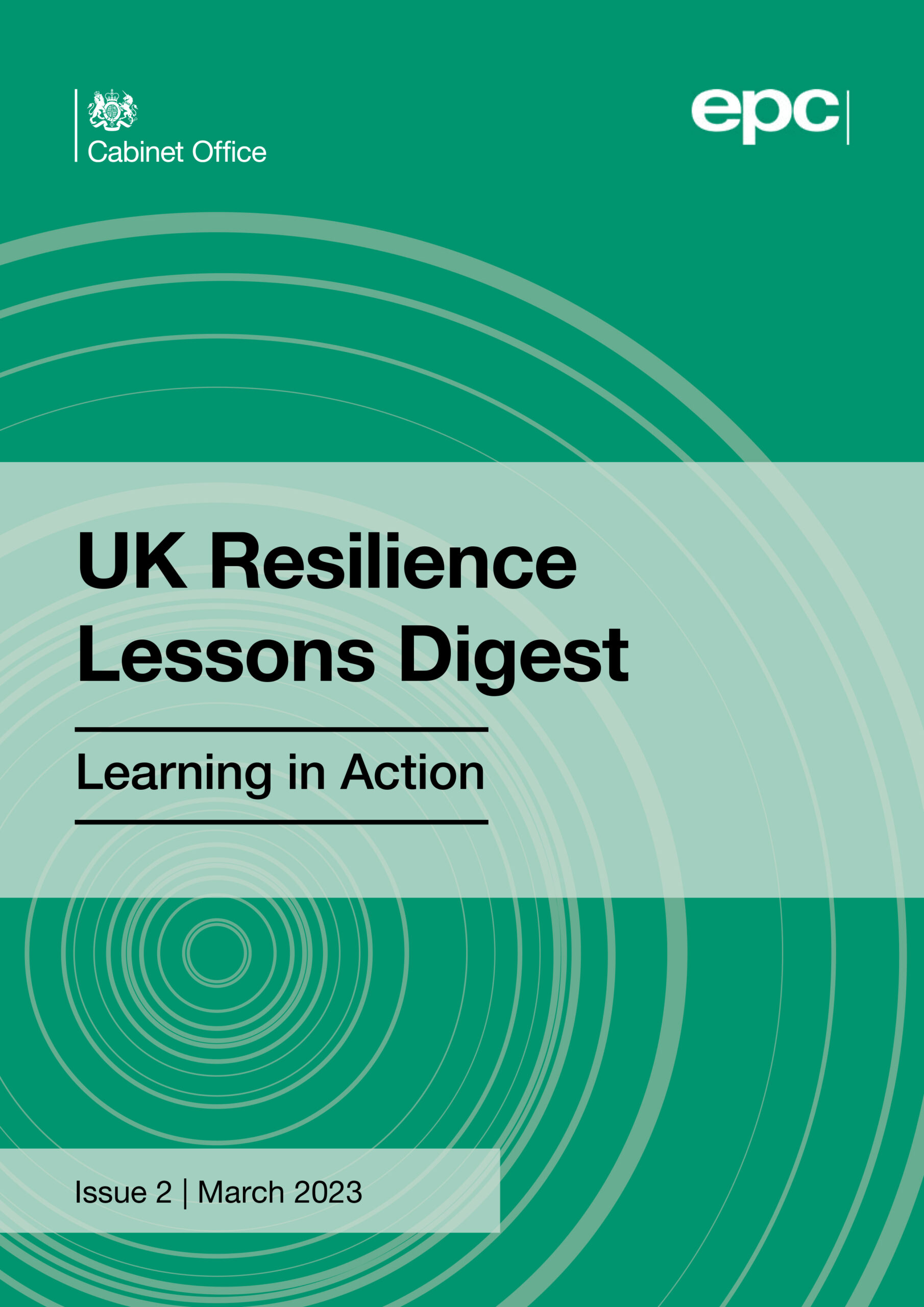
The second volume of the UK Resilience Lessons Digest was published this month. Once again, Lianna Roast , Resilience Knowledge Coordinator at the Cabinet Office Emergency Planning College, has provided an overview of the key themes in this issue.
On 22 March 2023 the Cabinet Office Emergency Planning College (EPC) published Issue 2 of the UK Resilience Lessons Digest, titled ‘Learning in Action’. This latest edition followed Issue 1 ‘Learning Together’, which went live via the EPC website last October and has since reached more than 40,000 readers across the resilience community. Initial monitoring of how much this Digest has been downloaded confirms there is very much a building interest in this series.
In line with the Digest’s overarching aim to synthesise lessons learned of all major exercises and emergencies, Learning in Action draws out important learning themes from more than a decade of emergency exercises. These themes were synthesised from 16 public-facing post-exercise and debrief reports, containing more than 450 lessons from rehearsed responses to a range of risks at national and local levels over a 12-year period.
Upon publication Director Mary Jones, Cabinet Office Resilience Directorate, said:
‘This second issue “Learning in Action” is important because it considers the resilience community’s experience of national, regional and local exercises, presenting a central academic analysis to support our shared understanding of risk.’
The analysis identified six key themes that appeared frequently across reports. In order of prevalence these were:
- information format and flow
- gaps in planning and preparedness
- role resilience
- training and exercising
- technological resilience and redundancy
- media challenges.
Each theme is unpacked in much greater depth and detail within the publication, highlighting a range of transferable ‘risk agnostic’ lessons and/or recommendations which can be applied in practice to strengthen preparedness.
Amazingly, and yet regrettably, it seems that these themes and lessons are as readily applicable today as they were when they were first identified. This is good news for practitioners wanting an academic analysis that offers genuine, applied value in practice. But one might ask whether the Digest is simply offering yet another exposition of lessons “we don’t learn”? Or perhaps argue that decade-old lessons should be left in the past, making way for a more explicit focus on the ‘latest’ learning from real-world emergencies. Both are fair viewpoints, but neither accurately reflect the underpinning principles that were set out in Issue 1 to inform the Digest and its content.
One of these principles is that ‘Lessons are time-sensitive, not time-limited’. Applying this principle in practice enables Digest Issue 2 (and future editions) to do two things in tandem:
- 1. Acknowledge the importance of capturing the ‘latest’ lessons and learning whenever
they become available. - 2. Remember how important it is to learn, re-learn and revisit lessons from the past.
In this way, lessons old and new can be brought together to inform a richer and more integrated learning picture. The exercise analysis in ‘Learning in Action’ offers an example of how this can work in practice.
First, the focus on lessons from exercises can be directly linked to some of the latest articulated learning challenges arising from the Manchester Arena Inquiry. The Volume 2 report was published online in November 2022, setting out the Chair’s findings and recommendations on the emergency response to the attack. Within this Volume, specific issues with identifying, recording and responding to lessons learned from emergency exercises were highlighted. In response, it is hoped that a range of responder organisations and resilience professionals will find the Digest’s analytical overview of lessons identified from a range of exercises of practical interest.
The inclusion of lessons identified from more than a decade ago speaks to the second point about remembering and revisiting learning. Rather than imposing an arbitrary expiration date and discarding older lessons, the Digest assumes that learning from exercises and emergencies is rarely (if ever) a ‘one and done’ endeavour. It recognises that lessons may require time to address in practice, remain relevant beyond their report release date and require re-learning as roles change and successive staff cohorts enter the resilience profession. Besides, if the past has taught us anything it is that one should not presume the passage of time alone ensures, or equates to, embedded learning in practice.
This is why the Digest also seeks to promote applied learning and the embedding of lessons throughout the publication. For example, Issue 2 also provides practical examples of learning in action at both national and local levels, along with key insights from applied research on mutual aid during Covid-19 and tools for using lessons from exercises to inform ‘futures thinking’ and onward preparedness. By sharing this knowledge alongside the analysis of learning themes and transferable lessons, it is hoped that the Digest will be a tool in the hands of those who are practically putting learning into action across departments, organisations, sectors and communities.
As always, the Digest welcomes feedback from the resilience community to ensure it evolves to remain relevant going forward. This can be done via a short 2-minute feedback form here. For more information on the Digest and to download Issues 1 and 2, please visit the EPC Knowledge Hub.
